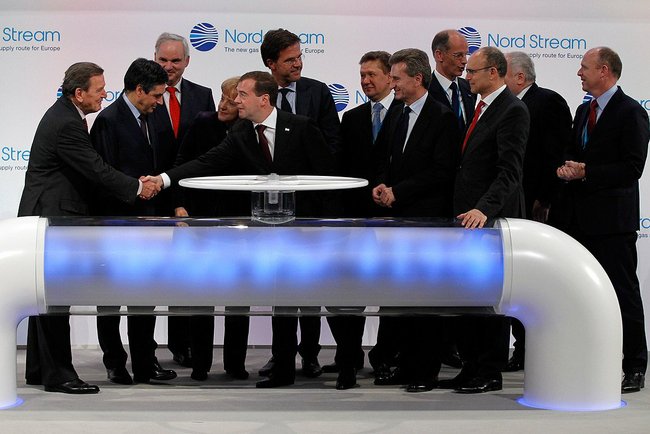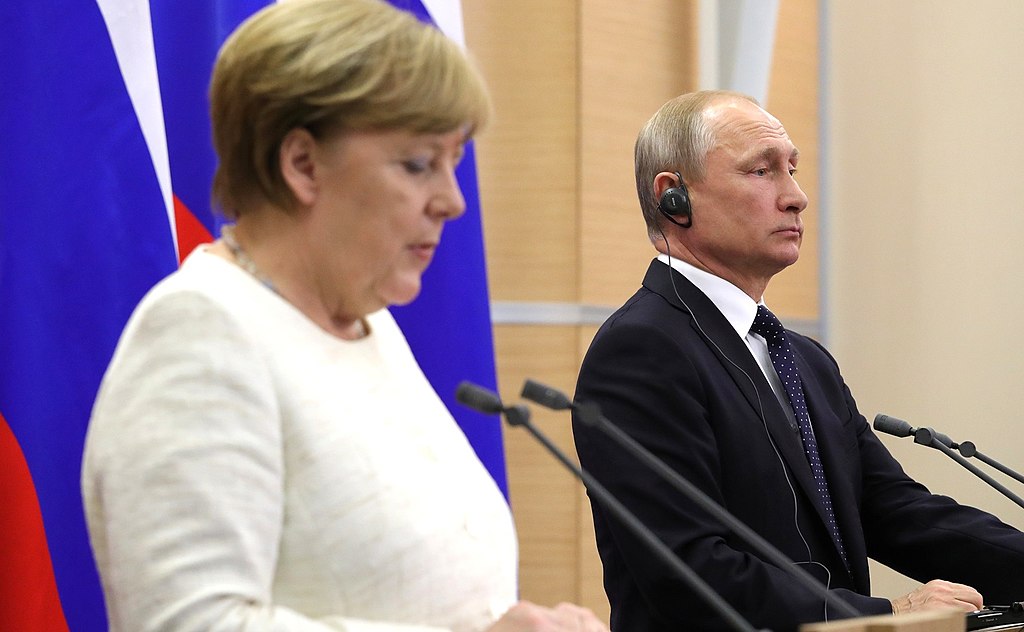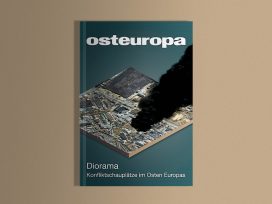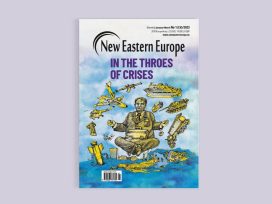The ruins of Ostpolitik
The Russian invasion of Ukraine shows just how misguided German Ostpolitik has been over the last two decades. Even after 2014, when it was clear that economic rapprochement had brought no normative changes to Russian policy, Germany went ahead with Nord Stream 2.
Berlin made a momentous blunder long before Angela Merkel came to power and early on in Vladimir Putin’s reign, which so far counts two premierships and four presidencies. In September 2001, the German government invited Russia’s newly-minted second president to address the assembled Bundestag.
No other Russian head of government or state had ever received such an honour – neither Mikhail Gorbachev as indirectly elected Soviet President of 1990–1991, nor Boris Yeltsin as the first Russian elected head of state from 1991 to 1999. Not even Dmitry Medvedev, Putin’s liberal stooge in the presidential office from 2008 to 2012. On the basis of their world views, these three presidents would have all been more worthy speakers to the German parliament than Putin. At least Gorbachev spoke, as a private citizen, in the Bundestag in 1999 – long after his departure from politics.
Taken on its own, Putin’s relatively pro-western 2001 Bundestag speech, delivered in German, was largely uncontroversial. But the circumstances surrounding his performance in Germany’s national parliament were dubious. The Bundestag reacted with ovations to the courtship of a Russian politician who, as a KGB officer in Dresden, had been part of Moscow’s occupation machinery in eastern Europe.
Even more problematic was that Putin had been invited to Berlin at a time when Russian forces stood uninvited in another country. During Putin’s 2001 visit, Russian troops were stationed in the Transnistrian region of Moldova. They had been there since the disappearance of the USSR in 1991. Until today, a small Russian unit remains in Transnistria against the Moldovan government’s will.
In 1994, in a bilateral treaty with Chişinău, Moscow agreed to withdraw its military from Transnistria, after it had unlawfully intervened in an internal Moldovan conflict in 1992. At a November 1999 OSCE summit, Moscow committed itself once more, in the multilateral ‘Istanbul Document’, to exiting Transnistria. By then, as Russia’s newly appointed prime minister, Putin was already de facto ruling Russia.
However, when Putin gave his speech to the Bundestag, Russian troops had still not fully pulled out of Moldova. Nor was there any indication that Moscow would any time soon fulfill its obligations towards the non-aligned Moldovan state. Merkel attempted to reach a solution to the Transnistrian problem with Medvedev in 2010–2011, as part of the so-called ‘Meseberg Process’. However, her considerable efforts were unsuccessful. That was because Putin – and not the relatively pro-western Medvedev – continued to hold the reins of power in Moscow, as Russia’s prime-minister during 2008–2012.
The considerable domestic and foreign policy regressions under Putin, already visible by September 2001, were not mentioned during his visit to Germany. The invitation of the German parliament and the reaction of the MPs to Putin’s speech sent the signal to Moscow that ongoing violations of international and human rights were of secondary importance when it came to the relationship between the two largest nations of Europe. The chemistry between Moscow and Berlin was more important than the principles laid down in such documents as the 1975 Helsinki Final Act or 1990 Charter of Paris.
At least that is how many Russian politicians and diplomats appeared to understand Berlin’s loud silence on Transnistria and Chechnya in 2001. East-West trade, good personal relations, and fair-weather rhetoric take precedence over western values, international law and European security.
Berlin’s destructive pipeline policy
A second fateful decision that predetermined the eastern policy of Merkel’s chancellorship was made in 2005, around the time she took office. In the final weeks of the Schröder chancellorship, as well as in the months that followed, the first Nord Stream project was initiated. Schröder’s subsequent employment by Gazprom (and later Rosneft), and the massive propaganda about Europe’s allegedly dire need for Russian undersea pipelines, set the course for Merkel’s future Ostpolitik.
These developments created legal, informal and discursive frameworks at the beginning of Merkel’s reign that had a lasting impact on her approach to Russia. The repercussions of these early decisions continue to shape the debate on German foreign economic and policy, as well as Berlin’s relationship not just with Moscow, but also Warsaw, Kyiv and Vilnius.
The underwater pipeline projects initiated by outgoing chancellor Schröder in 2005 and later promoted by him in his function as chairman of the supervisory boards of Nord Stream and Nord Stream 2 were resolutely implemented, despite their economic redundancy. In the apologetic narratives, the projects were presented partly as purely commercial initiatives, partly as clever geo-economics, and partly even as smart security policy. Such stories had and have broad appeal, even though the overcapacity for transferring Siberian natural gas to Europe and the serious geopolitical consequences of the new pipelines are now readily apparent.
Reducing Moscow’s crippling dependence on the Ukrainian gas pipeline system by commissioning the first two Nord Stream lines in 2011–2012 was from the outset more than a new Russian foreign trade strategy. As misleading as the thesis of an alleged need for the Nord Stream projects for European energy security was and is, as real was and is the need for the Kremlin to reduce Ukraine’s role as a transit country for Siberian and Central Asian gas flowing into the European Union.
Only the partial achievement of this goal with the full operation of the first Nord Stream pipeline from October 2012 made it possible for Russia to continue to avenge the collapse of the USSR in Ukraine, as had already been done in Moldova and Georgia.
Gazprom’s opportunity, from late 2012, to bypass Ukraine for much of its export to the EU was a necessary condition, though not the sole one, for the increase in Russian aggressiveness towards Ukraine. The Kremlin’s new intransigence manifested itself even before the EuroMaidan Revolution began.
Over the course of the last peace year of 2013, there were a number of belligerent signals and actions by Moscow towards Kyiv. For example, in August 2013, the Kremlin imposed a complete blockade of all trade between Ukraine and Russia that lasted several days. Moscow’s escalating rhetoric and sanctions policy led to rising tensions in between the two nations before the Kyiv protests began in late 2013. This despite the fact that Ukraine still had an explicitly pro-Russian leadership with the then-president Viktor Yanukovych and prime minister Mykola Azarov. Their imminent loss of power was not yet in sight.
Moreover, the Yanukovych was removed from office not by the Maidan revolutionaries, as it is often purported. On 22 February 2014, after the street fighting had ended, the Ukrainian parliament, which until then had been loyal, withdrew its support for him.

Dmitry Medvedev in Germany to inaugurate Nord Stream 1 in 2011. Source: Wikimedia Commons
Repetitive behaviour
In response to Yanukovych’s ouster, Moscow shifted its Ukraine policy to the strategy it had pursued years earlier vis-à-vis Moldova and Georgia. Following years of rhetorical, political and economic attacks on Kyiv, Moscow began a partly military, partly paramilitary occupation of Crimea in February 2014, and the Donets Basin in March 2014, as it had done earlier in Transnistria, South Ossetia and Abkhazia.
To this day, many western interpreters of Putin fail to recognize the regularity of the Kremlin’s behaviour. Despite the precedents of Moldova and Georgia, some commentators some commentators insist that Ukraine case was exceptional and that misguided EU policy towards the country was to blame.
The republics of Moldova and Georgia did not need to be parts of Eastern Slavic culture or be involved in association negotiations with Brussels for a receipt of military punishment by the Kremlin. The two post-Soviet republics had already lost control of larger portions of their state territories than Ukraine in 2014. Chişinău and Tbilisi met their fates long before Russia’s attack on its western-oriented ‘brother state’, allegedly incited by radical nationalism and western overreach.
The well-known German formula of Annäherung durch Verflechtung (‘rapprochement through interwinement’) now took on more than a metaphorical meaning. Germany and Russia-controlled territory have since moved closer not only economically and politically, but also geographically.
However, the reverse conclusion of this law of international relations is also true. The new gas volumes that since 2011 – via the Baltic Sea – have brought Germans and Russians ever closer together have been lacking for the maintenance of Russian-Ukrainian proximity.
As both interdependence theory and the intertwinement formula predict, the development of economic connections does not only lead to more peaceful relationships between the countries involved. A parallel reduction of economic ties with other countries can mean less peace for them.
As a result of Germany’s increasing energy interdependence with Russia since 2005, the transit states for Siberian gas flows that have become disentangled from economic exchange with Russia suffered a reciprocal alienation from Moscow. In particular, Ukraine’s economic distancing from the Russian Federation after the completion of the first Nord Stream pipeline in late 2012 led to an increase of tensions between the two countries in 2013. Ultimately, this escalation resulted in Moscow’s occupation of first the southern and then the eastern territories of the Ukrainian state in 2014.
The relative gain in national security from the Nord Stream projects is small for Germany, a NATO state located far away from Russia. In contrast, the equivalent reduction of Russia’s dependence on its former colony and neighbour state Ukraine proved fatal for the integrity of the latter. The all-European loss of stability due to Moscow’s annexation of Crimea and the intervention in Donbas in spring 2014 far exceeds the marginal security gains for the EU from the completion of Nord Stream 1.
While Merkel bears little responsibility for the ill-fated Bundestag invitation to Putin in 2001, she is partly to blame for the Nord Stream projects and their consequences. She may not have been able to prevent the completion of the first Nord Stream pipeline in 2012, if she had wanted to do that. But the start of construction of Nord Stream 2 in 2015 is a puzzle and creates an impression of cognitive dissonance in Berlin. Had the Kremlin not made its intentions regarding Ukraine sufficiently clear in 2014?

Angela Merkel and Vladimir Putin in 2018. Source: Wikimedia Commons
The double error with Georgia in 2008
In 2008 Berlin made two further mistakes that – in contrast to the two Nord Stream projects – have been hardly discussed. German signals sent to Moscow at that time were to have far-reaching consequences for Russia’s Ukraine policy, as was been the case with the Bundestag invitation to Putin in 2001 and the signing of the Nord Stream contract in 2005.
When Georgia and Ukraine jointly applied for NATO membership in early 2008, they were in different starting positions. More than two-thirds of the Georgian population at the time supported the country’s entry into the alliance. In Ukraine, nearly two-thirds still opposed NATO membership – an attitude that turned into its opposite only after the Russian attack in 2014.
Unlike Ukraine, Georgia had not been a fully sovereign state for long and had sustained troubled relations with Russia. Moscow had already installed separatist satellite regimes in the regions of Abkhazia and Tskhinvali – also known as ‘South Ossetia’ – in the 1990s, there controlling approximately 20% of Georgian state territory. Although the Ukrainian territories that came under official or de facto Russian control in 2014 are larger than the corresponding Georgian parts of the country, they account for only about 7% of Ukrainian state territory.
Preparations for NATO membership in Georgia were already advanced in early 2008. The country had begun the usual process of reforms before applying to join the Alliance. Against this background, the NATO Summit in Bucharest marked another unfortunate milestone in western policies towards the post-Soviet area, which was largely due to Berlin’s influence in the alliance.
During the controversial internal deliberations within the alliance in 2008, Berlin could as a compromise have proposed a differentiated treatment of Georgia’s membership application as well as that of Ukraine. Instead, Germany insisted on a de facto rejection not only of Kyiv’s membership application but also of Tbilisi’s.
Although the alliance stated that Georgia and Ukraine ‘will become members’, there was no indication of when or how the entry of the two post-Soviet states into NATO would occur. The conditions for accession processes of Georgia and Ukraine remained unclear, as did the question of whether they would proceed in a package or separately.
The middle ground found by NATO in 2008 was ultimately worse than an outright and official rejection of Georgia’s and Ukraine’s applications. The membership pledges distracted Kyiv and Tbilisi from pursuing other security-enhancing strategies and created a sense of urgency in Moscow.
The Kremlin intensified both its Georgia and Ukraine policies in response to the Bucharest NATO summit. While Moscow still had sufficient levers of domestic political influence in Ukraine at the time, Georgian domestic politics was already happening largely autonomously. In early summer 2008, Putin therefore thawed the frozen conflict in the Tskhinvali region, thereby provoking a hasty response from the president of Georgia, Mikheil Saakashvili. The result was the Russian-Georgian Five-Day War.
The Russian invasion of Georgia was ended by the ‘Sarkozy Plan’. In the EU-brokered cease-fire agreement in mid-August 2008, Russia committed to withdrawing the regular troops it had stationed in the Tskhinvali and Abkhaz regions the previous week. However, in the following months and eventually years, the Kremlin repeated its older, above-described pattern of behaviour. As in the case of the bilateral and multilateral treaties regarding Transnistria signed by Russia in the 1990s, Moscow did not implement the Sarkozy Plan of 2008. Instead, it left its troops on Georgian territory.
Moreover, the Kremlin transformed the two Georgian separatist regions into the pseudo-states of Abkhazia and South Ossetia. Unlike the so-called ‘Pridnestrovian Moldavian Republic’ (and later the ‘Luhansk’ and ‘Donetsk People’s Republics’), Russia even recognized its two satellite regimes on Georgian territory as independent countries. With Moscow’s official confirmation of the statehood of the Russian artificial entities in northern Georgia, the Kremlin went beyond its previous neighbourhood policy and entered new territory in its interpretation of international law.
Largely at the instigation of Berlin, NATO sent a risky signal to the Kremlin in April 2008. The implicit message was that even the most elementary security interests of Russia’s pro-western neighbours were secondary to the will of the Kremlin. With its Georgia policy in 2008, Merkel’s government reaffirmed the impression that Berlin had already left on Moscow in 2001, with its neglect of Moldovan security interests. For the Kremlin, it can be assumed, this established a reassuring continuity in Germany’s eastern policy.
Worse still, Moscow’s manifest violation of the Sarkozy plan and military dismemberment of Georgia into three states officially recognized by Russia remained without consequences for the Kremlin. Brussels ended the already minimal European sanctions imposed after the war in the Caucasus and resumed negotiations over a new co-operation treaty with Russia, which had been interrupted in August 2008.
Germany went even further at the Eighth St Petersburg Dialogue conference from 30 September to 3 October 2008. Just a few weeks after the Russian-Georgian war and shortly after Moscow’s recognition of Abkhazia and South Ossetia, the Chairman of the German Steering Committee of this bilateral organization, Lothar de Maizière, and the Deputy Chairwoman, Liudmila Verbitskaia, the Rector of St Petersburg University (Putin’s alma mater) signed a ‘Joint Declaration of the Petersburg Dialogue on Shaping the Partnership for Modernisation’. In 2010 the German project of so-called modernization partnership with Russia was elevated to the European level and adopted by both the EU and subsequently many member states.
Strangely, after Russia’s invasion, bombing and dismemberment of Georgia, relations between Berlin and Moscow did not cool down but warmed up. Of course, the German and other Western European advances towards the Kremlin did not contain any explicitly affirmative signals regarding Russia’s violations of international law and human rights in Moldova, Chechnya or Georgia. On the contrary, both Berlin’s and the EU’s so-called Strategic and Modernisation Partnerships with Moscow officially aimed to bring Russia closer to Europe in normative terms by means of the political spillover effects of economic rapprochement.
However, as we now know, Berlin’s noble intentions and strategic calculations were misguided. From the outset, they could not compensate for the high costs of Germany’s rapprochement and interdependence strategy towards Russia. The tacit neglect of the elementary interests of the successor states of the USSR, and the implicit acquiescence to the Kremlin’s repeated undermining of principles of international law in the post-Soviet space, were never going to end well.
German and European forbearance toward Russia’s behaviour on the Nistru, and in the North and South Caucasus, have borne fruit neither in domestic nor in foreign policy terms. Berlin hoped to promote a pro-western change of direction in Moscow, but the opposite has been the case.
Ukraine as an aftermath
Russia’s annexation of Crimea and the intervention in eastern Ukraine in 2014 appeared to many observers as unprecedented aberrations in eastern European geopolitics after the end of the Cold War. In fact, these developments were simply the continuation of older trends. In some respects, they were the logical outcomes of earlier domestic political dynamics within Russia, which had repercussions for Moscow’s foreign affairs and western responses to them.
With Merkel’s assumption of the chancellorship in 2005, it seemed that Germany had an ideal occupant in its highest office of government to respond to the new challenges in eastern Europe after Putin rise to power in 1999.
But it gradually became clear that the new chancellor was unwilling or unable to abandon the track Germany had taken in its Russia policy under Schröder. Merkel’s diplomatic engagement in eastern Europe did increase and was particularly notable in 2014–2015. It may be thanks to her that Putin did not push deeper into Ukrainian territory at the time. However, the paradigm shift in Germany’s Russia policy, the necessity of which became obvious in 2014, failed to materialize – a fact that became manifest with the start of the Nord Stream 2 project in 2015.
Despite her competence and obvious disappointment with Putin, Merkel was unable or unwilling to make the long overdue shift in German Ostpolitik. Instead, Berlin’s behaviour towards Russia’s authoritarian regime remained and remains characterized by the decisions of a man who is a political friend of Putin and has been an employee of the Russian state since 2005. How much more blood will have to spill in order for Berlin to turn away from this position?
Published 23 February 2022
Original in English
First published by New Eastern Europe 1-2/2022
Contributed by New Eastern Europe © Andreas Umland / New Eastern Europe / Eurozine
PDF/PRINTPublished in
In collaboration with
In focal points
Newsletter
Subscribe to know what’s worth thinking about.
Related Articles

On the occasion of Europe Day, Oleksandra Matviichuk, Ukrainian human rights defender and director of the Nobel Peace Prize-winning Center for Civil Liberties, delivered this year’s Speech to Europe at Vienna’s Judenplatz.

Whether defending human rights on an international stage, checking facts from the frontline, processing traumatic experiences over a lifetime, or even questioning the language you have spoken since childhood – all matter in the collective fight for justice.






